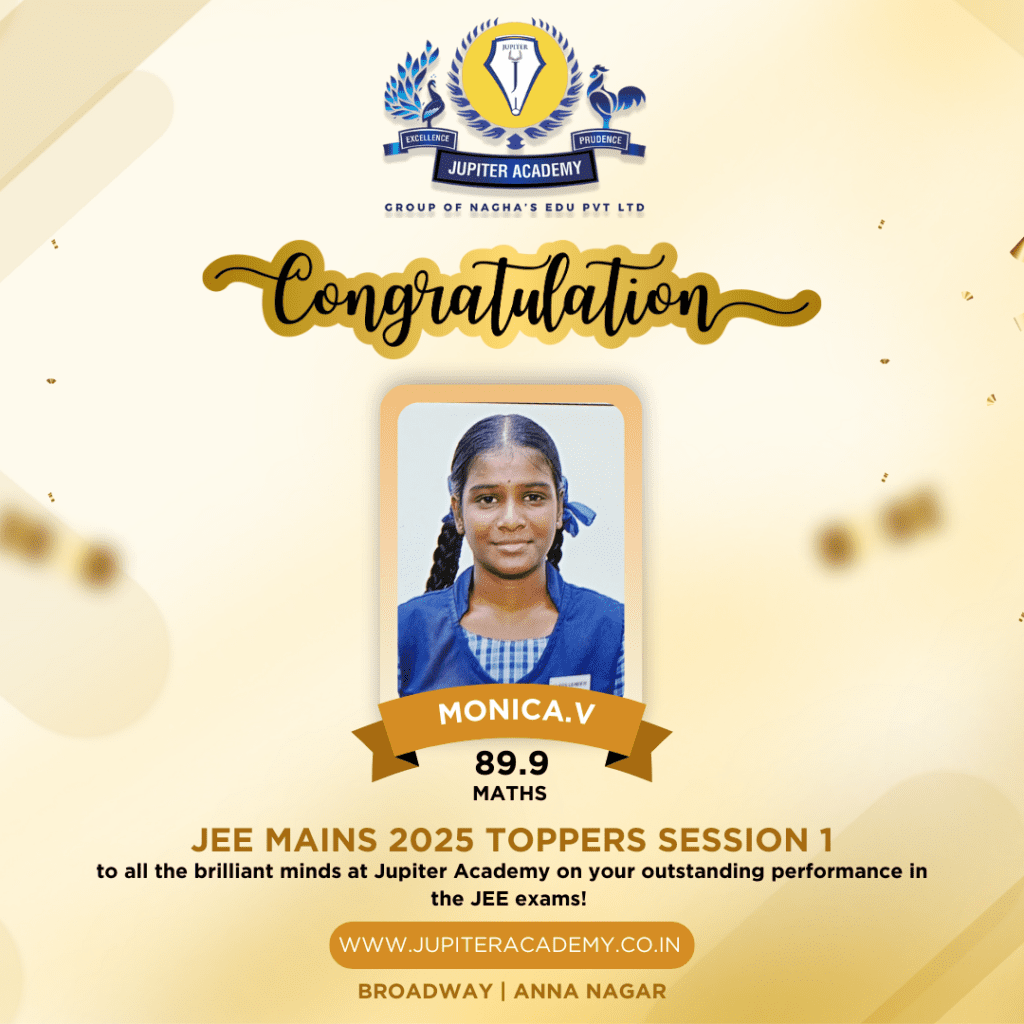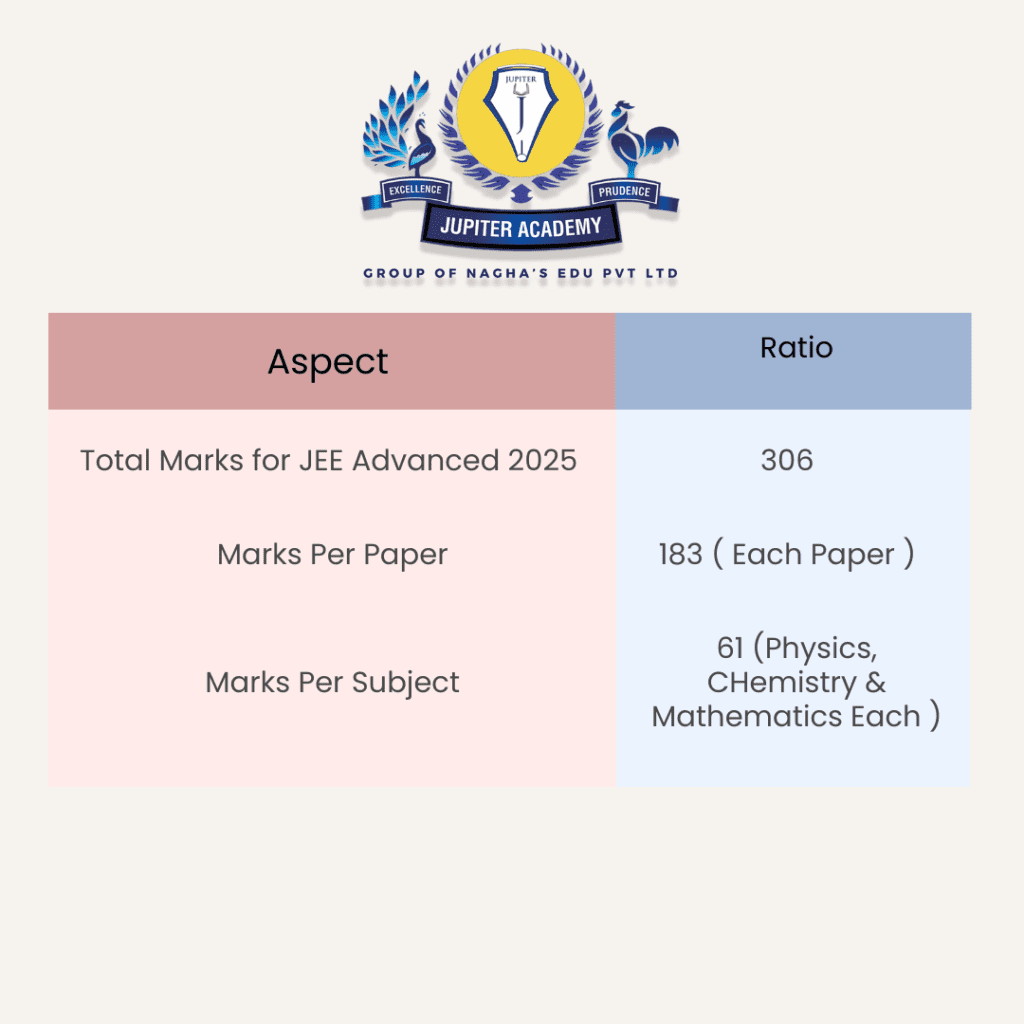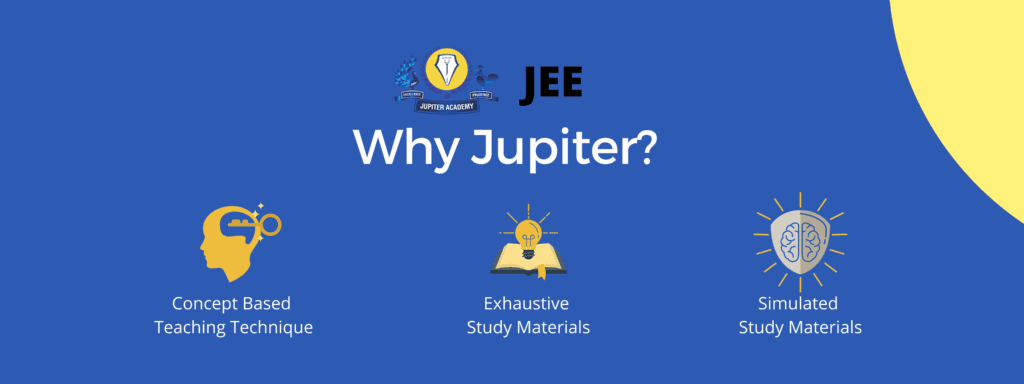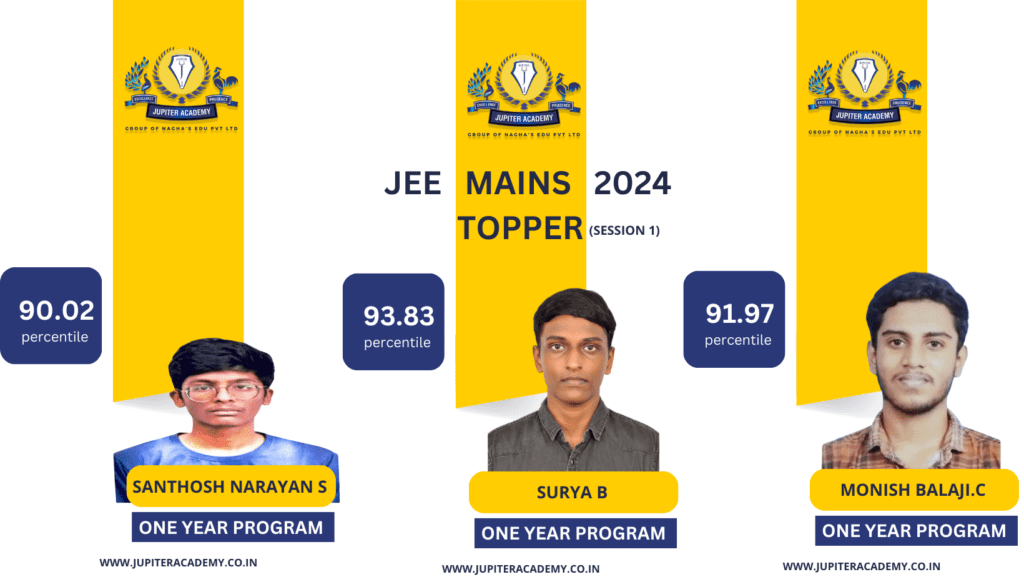


The Joint Entrance Examination (JEE) is an engineering entrance evaluation test conducted for entry to various autonomous and non-autonomous engineering colleges in India. It consists of two different examinations conducted one after the other JEE main and JEE Advanced.
JEE Main Introduction
JEE Main has two papers, Paper-I and Paper-II. Candidates may opt for either or both of them. Both papers contain multiple-choice questions. Paper-I is for admission to B.E./B.Tech courses and is conducted in a Computer Based Test mode. Paper-II is for admission in B.Arch and B.Planning courses and will also be conducted in Computer Based Test mode except for one paper, namely the ‘Drawing Test’ which shall be conducted in Pen and Paper mode or offline mode.
JEE Main is a qualifying examination to filter students for admission in IITs and NITs like institutions. Paper-1 consists of thirty multiple-choice questions in each of the three subjects (physics, chemistry, and maths) which are to be answered within 3 hours. 4 marks are awarded for correct answers and 1 mark is deducted for incorrect answers.
The cutoff for various categories in India like OBC, general, SC/ST, etc is different and generally varies in the range of 30 to 100 marks.
JEE Advanced Introduction
JEE Advanced is conducted by one of the seven IITs (IIT Roorkee, IIT Kharagpur, IIT Delhi, IIT Kanpur, IIT Bombay, IIT Madras, and IIT Guwahati) on a round-robin rotation pattern under the guidance of the Joint Admission Board (JAB). The examination has a very low qualification rate and is the only way to take admission to the Indian Institute of Technology for an undergraduate degree.
Students who rank among the top candidates for JEE Main are less than 25 years of age with 5-year relaxation for SC, ST, and PWD candidates and who have not accepted admission in any of the IIT earlier are eligible for the examination. Students are allowed to attempt the examination at most two times in two consecutive years and should have qualified the class XII board examination in the previous year.
Difference Between JEE Main And JEE Advanced.
JEE Main is the qualifying exam for JEE Advanced. There are some major differences between the two.
JEE Mains VS JEE Advanced – No. of Attempts
Students can appear in the JEE Main exam four times in a year. Also, students can appear in JEE Main in three consecutive years from the year of passing their class 12 exam. NTA has not mandated any criteria for age of candidates appearing for the JEE Main. Whereas, students can attempt JEE Advanced exam for maximum two times in consecutive years.
Also, it acts as a filter that if a student is not able to get a good enough rank to secure his/her seat in their desired institute after 2 or 3 attempts, then maybe they are not fit for the degree.
The difference in Difficulty Level of JEE Mains & Advanced
JEE Main tests students based on their knowledge of class 10th and 12th whereas JEE Advanced tests students focusing more on their problem-solving skills. The numbers show us that JEE Mains has a high qualification rate compared to JEE Advanced based on the number of students appearing for the exam. JEE Advanced has more aptitude and planning based objective type questions making it difficult than its counterpart.
JEE Mains VS JEE Advanced – Difference in Eligibility Criteria!
Students should have passed class 12 or qualifying exams in the Science stream in the previous year to which they are attempting the JEE Main exam to be eligible for it. Students who rank among the top after JEE Main results i.e. above a certain cutoff are only eligible to appear for JEE Advanced. They can appear for JEE Main for 3 consecutive years and it is conducted twice a year. On the other hand, they are eligible to appear for 2 consecutive years for the JEE Advanced.
Students of the general category who are born on or after October 1, 1996, are eligible to appear for JEE Advanced. Relaxation of 5 years is given to those of the SC/ST/PwD category. There is no age category for JEE Main. Here, any candidate who has given class 12th exam in the current academic year or previous year is eligible for appearing the exam.
Difference between JEE Main and JEE Advanced in terms of Syllabus
The syllabus of JEE Main comprises the syllabus of CBSE class 11 and 12 Physics, Chemistry and Mathematics subjects. Topics like Electronic Devices, Electromagnetic Waves, and Communication Systems are included in JEE main but are not asked in JEE Advanced. Similarly, some of the topics of Mathematics like Sets, Relations and Functions, Statistics and Probability, Trigonometry, and Mathematical Reasoning are included in JEE Main but not in JEE Advanced. You can check out the complete syllabus of JEE Main 2025 on their official website.
JEE Advanced includes topics like Thermal Physics, Electrochemistry, aptitude questions, etc apart from the syllabus of class 11th and 12th which are not included in the syllabus of JEE Main.
JEE Mains VS JEE Advanced – Paper Pattern
Both JEE Mains Paper 1 and JEE Advanced are conducted in CBT mode. JEE Main Paper II has drawing conducted in pen and paper mode and mathematics and aptitude in CBT mode.
The type of questions in JEE Main Paper I are 60 MCQs having 4 options each with one correct option and 15 numerical type questions which are to be completed in 3 hours. JEE Main Paper II has 20 MCQs from Maths + 5 Questions for which answer is a Numerical Value + Aptitude- 50 MCQ + Drawing- 2 Questions. The total marks for Paper II are 400 compared to Paper 1 which was 300 and is to be completed in 3 hours.
For JEE Advanced the exam Paper pattern keeps on changing but the pattern for the year 2021 is announced. There will be 20 MCQs for Maths + 5 Questions for which answer is a Numerical Value + Aptitude- 50 MCQs + 25 MCQs of Planning Based Objective Type. The time limit for this is 3 hours and the total marks are given out of 400.
Both the exams are conducted in English, Hindi, and Gujarati languages where Gujarati is used only in center cities in Gujarat. The marking scheme for both the exams is, 4 marks are awarded for correct answers and 1 mark deducted for incorrect answers. The 2 drawing questions are of 100 marks each and unattempted questions do not cost you any marks.
The 2021 exam pattern of JEE Advanced has 2 papers where Paper 1 has MCQ type questions and Paper 2 has numerical type questions.
JEE Advanced Paper Pattern 2025
JEE Advanced 2025 will follow a similar pattern as previous years, consisting of two papers, each of three hours duration, covering Physics, Chemistry, and Mathematics. The exam will be conducted in computer-based test (CBT) mode and will comprise multiple-choice questions (MCQs), numerical answer type (NAT) questions, and matching-type questions.


JEE Advanced Total Marks 2025
JEE Advanced exam pattern total marks for 2025 is 306 points, divided into two papers, each worth 183 marks. It’s important to note that the total marks for the JEE Advanced exam have varied slightly in recent years. For example, in 2021 it was 360 marks, and in 2020 it was 396 marks.


JEE Advanced Exam Pattern 2025 Paper-Wise
JEE Advanced 2025 comprises two papers, each of three hours duration. Both papers are mandatory and carry equal weight. The exam encompasses of multiple-choice questions (MCQs), numerical answer type (NAT) questions, and matching-type questions/paragraph type with numerical answers. The subjects covered are Physics, Chemistry, and Mathematics.
JEE Advanced Exam Pattern for Paper 1 (Physics, Chemistry and Mathematics)
JEE Advanced Paper 1 demands a thorough grasp of the exam pattern, including question types, and marking scheme. Paper 1 consists of MCQs selecting the single correct answer from a given set of options. NAT questions involve entering a numerical value with specified precision. Matching-type questions demand matching items from one list to another. Check the below information for details




Physics:
Thermal Physics:
- Kirchoff’s Laws
- Newton’s Laws of Cooling
- Black-Body Radiation
- Absorptive & Emissive Power
- Stefan’s Law
- Wein’s Displacement Law
Chemistry:
Electrochemistry:
- Equivalent Conductivity
Electrochemistry:
- Radioactivity and Carbon Dating
- Kinetics of Radioactive Decay
- Fission & Fusion Reactions
- Proton to Neutron Ratio & Stability of Nuclei
Topics in the JEE Main Syllabus that are NOT a part of the JEE Advanced Syllabus
Physics:
Electronic Devices:
- Semiconductors & Semiconductor Diodes
- Forward & Reverse Bias
- I-V Characteristics of Photo-Diode
- Solar Cells
- LEDs
- Zener Diode as a Voltage Regulator
- Junction Transistors & their Characteristics
- Transistor Action
- Transistors as Amplifiers (Common Emitter Configuration)
- Transistors as Switches
- Oscillators
Electronic Waves:
- Definition & Characteristics of Electronic Waves
- Transverse Nature of Electronic Waves
- Applications of EM Waves
- Electromagnetic Spectrum
Communication Systems:
- Propagation of EM Waves
- Amplitude Modulation & Frequency Modulation
- Signal Bandwidth & Transmission Medium
- Basic Elements of Communication Systems (Block Diagrams)
Chemistry:
Biomolecules:
- Definition & Classification of Biomolecules
- Functions of Biomolecules
- Nucleic Acids & Their Chemical Composition
- Functions of DNA & RNA
Chemistry in Everyday Life
- Cleansing Action of Soaps & Detergents
- Chemicals in Food (Artificial Sweeteners & Preservatives)
- Analgesics, Tranquilisers, Antibiotics, Antiseptics, Antihistamines, Antifertility Drugs, Antimicrobials, & Disinfectants
Maths:
Sets, Relations, & Functions:
- Representation of Sets
- Unions, Intersections, & Compliments
- Types of Relations & Equivalent Relations
- Power Sets
- Algebraic Properties of Sets
Trigonometry:
- Heights and Distances
Statistics & Probability:
- Calculating Mean & Median
- Measures of Dispersion
- Calculating Mode of Grouped/Ungrouped Data
- Calculating Variance, Mean, & Standard Deviation of Grouped/Ungrouped Data
Mathematical Reasoning:
- Statements & Logical Operations
- Tautology
- Contradiction
- Converse
- Contrapositive
Important Topics that are a Part of Both JEE Main & Advanced Syllabus
| Physics | Chemistry | Maths |
|---|---|---|
|
|
|


